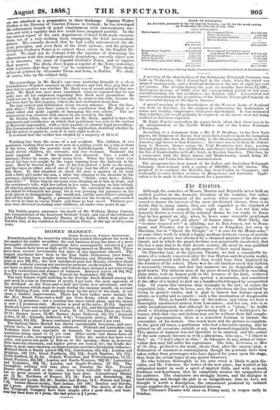gljt 64ratrt5.
Although the comedies of Messrs. Morton and Reynolds never held an exalted position in the dramatic literature of the country, but rather marked the commencement of the period, when success on the stage ceased to insure the interest of the mere intellectual classes, there is no doubt, that to many minds, they are still regarded as the standard of what truly British comedy really ought to be. Let not him who honestly desires a revival of the national drama be too ready to fancy that he has gained an ally, when he hears some venerable gentleman talk about the "good old plays" of former times. Most likely, the "laudator temporis acti" is alluding, not to Ben Jenson, not to Beau- mont and Fletcher, not to Congreve, not to Farquhar, not even to Sheridan, but to "Speed the Plough," or "A cure for the Heart-ache," or some other work in which a happy medium between excess of gravity and excess of gaiety was obtained by a chemical mixture of fun and sen- timent, and in which the grand doctrine was perpetually inculcated, that the less a man had to do with decent society, the more he was qualified to instruct his brethren in the performance of their social duties.
On Thursday last, at the Lyceum Theatre, we had a remarkable in- stance of a comedy conceived after the true Morton-and-Reynolds model, though constructed with less skill than would have been displayed by the founders of the school. There was the old familiar creed that fashion is necessarily vicious, and that bad manners are no despicable sign of good hearts. The virtuous man of the piece dressed himself in exceeding plain attire, took an honest pride in the lowness of his birth, withered with his sarcasms everybody who sported a moustache, and considered it the office of a lackey to pick up a handkerchief dropped by a coquettish lady. Of course this virtuous man triumphs in the end ; of course the coquettish lady, whom he loves, sees the wickedness she has imbibed by living in genteel circles, and is glad to bestow her fortune upon an adorer, so worthy and so caustic ; such a fine incarnation of disagreeable goodness. Then, as humble forms of shrewdness and virtue we have a thoroughly uneducated matron from Lancashire ; and her son, who is so nobly unsophisticated, that although he is worth a "plum," he walks about a drawing-room in attire representing that of a bricklayer's la- bourer, while that vice and fashion may not be without their full comple- ment of representatives, there is a conceited footman to imitate the coxcombry of his betters. One touch more and the picture is complete. In the good old times, a gentleman who had a favourite saying, that he uttered on all occasions, suitable or not, was deemed singularly facetious. This species of humour was not therefore to be omitted, and the author
of the new comedy favours us with a physician, who says, "I object to that," or, "I don't object to that," in reference to any action or obser- vation that may fall under his cognizance. The title, Extremes, or Men of Me Day, prefixed to the work, shows that, after the ancient plan, a delineation of manners is contemplated, though the portraits have been taken rather from personages who have figured for years upon the stage, than from the actual types of any period whatever.
He who believes thoroughly in his own creed is likely to gain dis- ciples, and Mr. Falconer, the writer of the new piece, has worked at his
antiquated model in such a spirit of implicit faith, and with so much freshness and heartiness, that he completely secures the sympathies of his audience. The characters are strongly drawn, and the dialogue is hard-hitting, and though the plot is so insignificant, that we have not thought it worth a description, the amusement produced by isolated scenes supplies the want of a sustained interest.
The Princess's Theatre will close on Friday next, to reopen early in October.


























 Previous page
Previous page